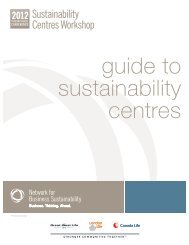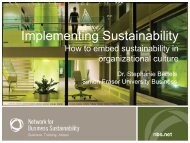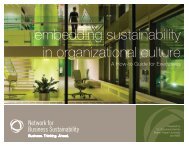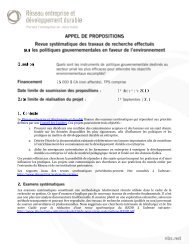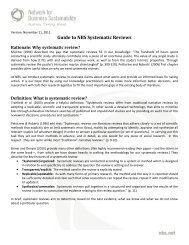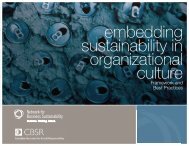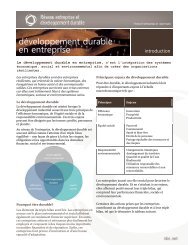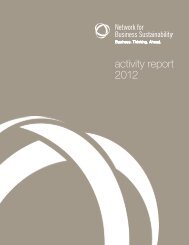Case Study - Network for Business Sustainability
Case Study - Network for Business Sustainability
Case Study - Network for Business Sustainability
You also want an ePaper? Increase the reach of your titles
YUMPU automatically turns print PDFs into web optimized ePapers that Google loves.
Engaging the Community: A Knowledge Project<br />
“There are people who drop money in The Whale Museum because they sign up on one of these<br />
trips. I think there would not be all this thought and protection if there had not been whale<br />
watching tours.”<br />
Conclusion<br />
The purpose of the WWOANW guidelines and managing practices is to protect killer whales while<br />
providing opportunities <strong>for</strong> the public to observe them in their natural habitat rather than in an<br />
aquarium or zoo. While there are legitimate concerns about the rapid growth of whale watch touring<br />
and a need <strong>for</strong> monitoring and proper management, the tour operators and drivers feel they are<br />
working to make whale watching safe <strong>for</strong> whales in the long term so that this <strong>for</strong>m of eco-tourism may<br />
be enjoyed by future generations. The Best Practices Guidelines developed by the industry are a positive<br />
factor in the conservation of killer whales.<br />
If it were not <strong>for</strong> the steps taken by the industry, an effective <strong>for</strong>m of management might not be in<br />
place. DFO (Pacific Region) continues to per<strong>for</strong>m an important monitoring role with respect to potential<br />
instances of harassment, which is prohibited by regulations under the Fisheries Act. However, it<br />
continues to provide support to the industry rather than assuming regulatory control. As a result, DFO<br />
(Pacific Region) has recognized the guidelines as a suitable model as evidenced by their participation<br />
with WWOANW to design programs that may increase compliance. Though private recreational boaters<br />
and non-member touring companies or individuals are not subject to the guidelines, member operators,<br />
Soundwatch, and M3 challenge other vessels’ inappropriate behaviour that might be due to ignorance<br />
rather than an intention to harm.<br />
Members of WWOANW take conservation ef<strong>for</strong>ts seriously. Their members understand that if there are<br />
no whales, there will be no industry. The whale watcher operators see their role, in part, as introducing<br />
the public to whales and to educate people to be respectful, to take action, and to conserve other<br />
marine species and the environment as a whole. They feel that their tours are an effective way to raise<br />
awareness of killer whales and issues relating to their biology, behaviour, and proper management. As<br />
gatekeepers of the whale watching experience, tour operators are in a unique position to transfer<br />
knowledge to the public about whales, their habitat and ocean conservation. Learning about killer whale<br />
biology and behaviour through the educational content provided on whale tours may encourage greater<br />
public support <strong>for</strong> whale conservation and their protection from potentially negative impacts.<br />
12




